It was back in July 2005. I was scribbling notes and grabbing color from a floor seat waiting on The Boss to come onstage when a woman played Chopsticks on my shoulder and snarled.
“Are you DAVID MENCONI?”
No, I told her. Really. I’m not. She softened immediately. Still, she ripped into something David wrote about some artist that she really liked – and David did not.
“I hate that guy!”
Oh, I understand. Don’t we all? Music is like the blood in our veins. It makes us go. We are passionate about what we like, what we love, and we’ll argue over any slight over an artist we set up there close to God.
I’ve seen it – and heard it — so many times.
I wrote about music for nearly two decades at the News & Record, the daily newspaper in Greensboro, N.C., and music fans have blistered me, too. I got belittled online, questioned in public, harangued on the phone and questioned bitterly once in a letter to the editor that carried this tone, “Who do you think you are?”
Then there was this one time I almost got in a fight.
It was October 1995. I was writing about a local blues band heading up to Memphis to compete in an international blues contest. I was watching them play an outdoor festival in downtown GSO before we all boarded a bus and headed west to see the sun rise over the Mississippi.
Before the band ended their last set, a guy came up and wanted to see what I was writing. I told him no. He mumbled something about giving me a fist sandwich and climbed up all close, poking out his chest, jabbing my pad with his finger and smelling like a weekend morning at a frat house.
I walked away. He stumbled away. So it goes.
During that time, of penning features and writing about music for the N&R, I always looked to David.
Read him, respected him, and if I was lucky, I ran into him. I’d see him at a show with his notepad handy or his nose in a laptop because his work environment was often a few steps from the warm glow of a stage.
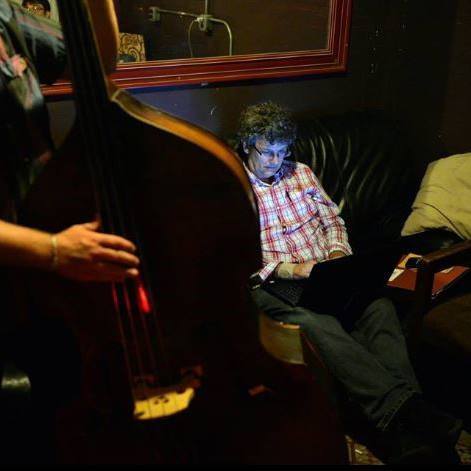
David in his element.
David had been the music critic since 1991 for the News & Observer, North Carolina’s granddaddy paper in Raleigh. He was good. He had won awards, written books and had his finger on North Carolina’s pop-culture pulse.
I remember him with Whiskeytown.
He was there when that band blossomed, and the wildly erratic and wildly talented Ryan Adams caught the public’s eye.
He wrote two books about Ryan – one fiction, another non-fiction – and he didn’t pull any punches about what he saw.
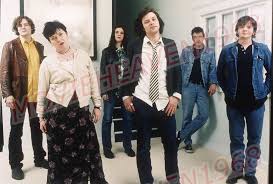
Whiskeytown
David never did that with anything he wrote about – and music fans didn’t always like him for it. Like that woman who sat behind me at Bruce Springsteen’s acoustic show at the GSO Coliseum, North Carolina’s biggest room.
David wrote tens of thousands of words for the N&O. He saw the birth of alt-country and the demise of The Brewery. Now, he says goodbye.
David leaves the paper Thursday. Like tomorrow. Crazy.
On Feb. 18, on his blog at piedmontlaureate.org, David wrote:
“Anxious and scared, for starters, especially over non-trivial matters like what we’ll do for health insurance. Bereft, kind of heartbroken, crushed — that starts to cover it.
“You’d think 28 years would be long enough to stay anyplace, especially when the job has changed as much as this one has. And yet part of me is still not ready to let go, even though this is a voluntary separation.
“But the only thing that feels “voluntary” about it is the timing. More layoffs and cutbacks seem inevitable, sadly, so at this point it’s jump or be pushed.”
We lose yet another vital voice on the printed page. Damn.
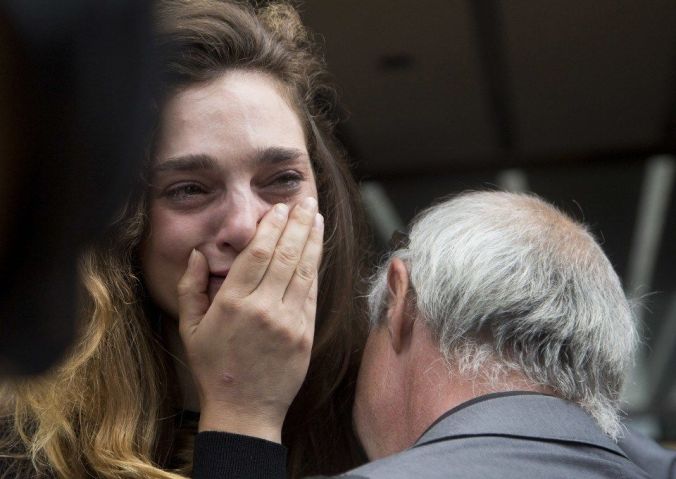
Reporter Chelsea Rose Marcius reacts to the layoffs at the NY Post in January.
David is an example of what we all see happening nationwide. Deadwood companies like McClatchy, which owns the N&O and the Charlotte Observer, are having to cut costs because their newspapers are bleeding money.
Some companies like BuzzFeed, the NY Post and the HuffPost are laying off reporters. Matter of fact, 2,000 journalists lost their jobs in January.
Other companies like McClatchy are offering buyouts. You know, here’s money we’ll give you if you walk out the door. David took the buyout. So did Kathleen Purvis and Tim Funk at the Charlotte O. So did Jane Stancill and Craig Jarvis at the N&O.
All veteran journalists, all scribes with scads of institutional memory walking out the door.
Damn.
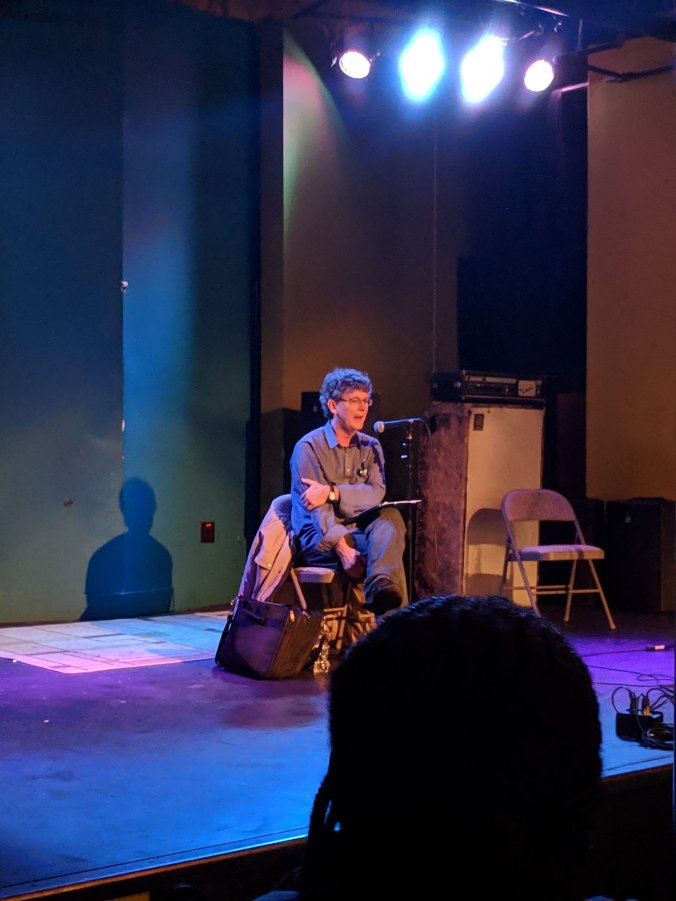
David talks Saturday about his life as a music writer at Kings in Raleigh as part of the North Carolina Book Festival.
Now to my friend, Rosemary Roberts.
Rosemary once worked as an editorial writer for the N&R. She now teaches journalism at UNC-Greensboro, and for the past eight years or so, I’ve talked to her students almost every semester about writing.
I always start the class with getting them to take on one of two writing prompts. One is write about someone you love; the other is about their worst date. That prompt … is always some kind of funny.
This time, Rosemary asked me to speak to her women’s group about this topic: What has happened to newspapers?
Sure, I told her. After 28 years of slinging newspaper copy in four states, I knew I’d enjoy a deep-dive into the why and hows of what has happened to an industry both David and I love.
So, two Fridays ago, in a well-upholstered room filled with 22 women up front and triangle-shaped, pimento-cheese finger sandwiches in the back, I rolled out what I found. I called it a “Requiem For Ink.”
It was downright debilitating.
First the numbers. Since 2008 …
- Newspaper ad revenue has fallen 63 percent.
- Newspapers have lost nearly 40 percent of their daily circulation.
- Newspaper jobs have fallen by almost half, from about 71,000 workers in 2008 to 39,000 in 2017 – or 24 jobs every day.
Now the big number.
- Since 1990, nearly 65 percent of all newspaper jobs have been eliminated, more than in the fishing, steel or coal industries.
Here’s what that looks like.
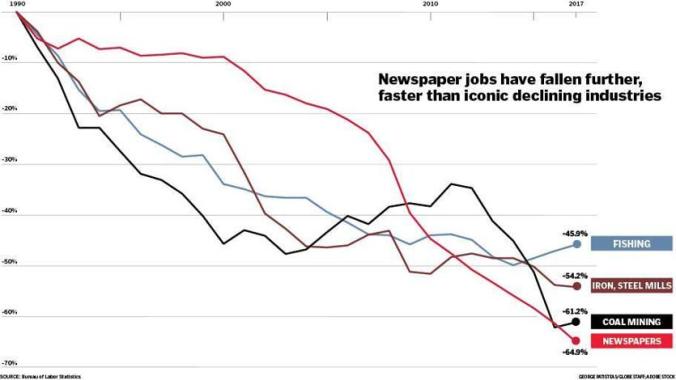
Those losses led to this.
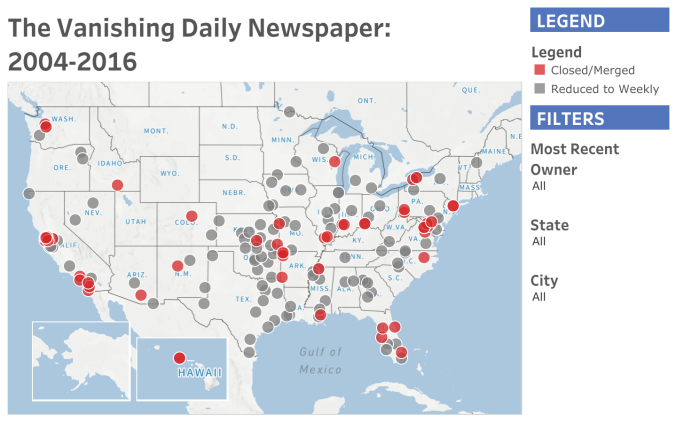
Behind those constellation of dots is this.
- Between 1970 and 2016, the year the American Society of News Editors quit counting, 500 or so dailies went out of business; the rest cut news coverage, or shrank the paper’s size, or stopped producing a print edition, or did all of that.
- Between January 2017, and April, 2018, a third of the nation’s largest newspapers reported layoffs. In a newer trend, so did about a quarter of digital-native news sites.
The why it all happened can be broken down into a handful of bullet points.
- Broken business model
- Google, Facebook, Craiglist
- Changing reader habits
- Rapid pace of technology
- Arrogance
- Greed
- Consolidation
- Our partisan world
And of course, the elephant in the room, the circus barker in the center ring.

Since becoming president, according to the Committee to Protect Journalists, Trump has tweeted more than 5,400 times to his nearly 58 million followers and 11 percent of those tweets either “insulted or criticized journalists and outlets, or condemned or denigrated the news media as a whole.’’
But really when you think about it, it all boils down to names.
Like Jane.
Kathleen.
Craig.
Tim.
And David.
Like with any good journalist, what David has written about over the years still sticks with me. It stokes memories of time, place and people. Sometimes, it’s funny. Other times, not so much.
Like the time Frank Sinatra died.
It was May 1998, a Saturday. I was at the beach for a few days with my wife, Katherine. Kath was pregnant with our first child, and we both saw the beach as a needed getaway before our days turned sleep-deprived and busy.
That Saturday, I got a call from my friend and old roommate, Dan. He was a huge Frank Sinatra fan. I mean, a HUGE Frank fan. He played Frank all the time at The Chalet, the name we called the house we rented in High Point. There, Dan played Frank LOUD.
Well, Dan called bawling. He told me Frank had died Thursday. Afterward, I scrambled to find a newspaper. I found an N&O. I found David. He wrote:
Before Elvis and the Beatles, he made bobby-soxers swoon. In one year alone, he had 15 hit songs. He won an Oscar, married movie stars and proved that thousands of people would pay to hear a 78-year-old man sing.
Frank Sinatra, who died late Thursday of a heart attack, was the last great mythic figure of American popular song. He leaves a legacy that doesn’t include just songs and films, but also the collective psyche of the last half of “The American Century.”
“Sinatra’s music is as resonant an American voice as we have,” Duke University professor Thomas Ferraro said Friday morning while “It Was a Very Good Year” played on his stereo in the background. “The man was an icon whose every move was oracular, yet he was also deeply flawed. He’ll be remembered for his unbelievably American capacity to reinvent himself.”
Said Friday morning while “It Was A Very Good Year” played on his stereo.
Nice.
Then, there was that particular Tuesday, September 2001.
I was running TriadStyle, the old alt-weekly in GSO, when terrorists turned airplanes into bombs. That afternoon, I stood in the office of N&R’s editor, John Robinson, surrounded by my colleagues I counted as friends when John looked around the room and said, “OK, what do we do now?”
I didn’t know. I was numb, on deadline, and I knew I had to write something that made sense of the senseless in the Editor’s Note on page 3. Right then, words just couldn’t come.
So I searched out David. I wanted to see how he deciphered this catastrophe of our time. He wrote about listening to Vince Guaraldi’s “Linus & Lucy” over and over and over. That helped him get his world right.
That day on deadline, with my mind scrambling with the unimaginable of what I saw on TV screens all day, I quoted David.
That, for me, worked.
Now, fast forward to 2012 and David’s book, “Ryan Adams: Losering: The Story of Whiskeytown.”
David was coming to GSO for a book reading, and I gave it a review for the N&R’s Sunday Book Page. It was a good book. I liked it. David had put together a book from his own observations from his front-row seat as well as 50 transcripts of interviews, much of which he kept in boxes under his desk at the N&O.
I wrote:
In “Ryan Adams,” Menconi uses his talent to give an unvarnished portrait of an exceptional talent and relies on his late-night knowledge gained from two decades of shoe-leather reporting to detail a music scene he knows as well as his own family.
It’s a rollercoaster ride of a read, full of laugh-out-loud gems.
Like this one from a frustrated road manager following one of Adams’ onstage antics: “Do you have any idea how lucky you are, that people come to hear these songs you wrote on a bar napkin?”
Or this one from Menconi himself.
He wrote a long profile of Adams in the magazine “No Depression,” and Adams didn’t care for what Menconi wrote. So, he sent Menconi an email. With typos and no punctuation included, Adams wrote:
“im drunk and in seattle and i just went to see a “spiritual guide” (they call him a shaman) and my life is changed. hard changed. i hope to think about you in my meditations. peace and cookies.-
- R
Get it? Menconi did. He had it in his box.
Singer-songwriter Molly McGinn and I commiserate with David about something after his book reading in 2012 at the Barnes & Noble at the Friendly Center. Just don’t know what I’m doing with my finger. Photo courtesy of Eddie Huffman
Finally, to Thursday. This Thursday. Yeah, tomorrow. David’s last day.
Kath saw it first. Then, I read it countless times. Hated it. But I so understood.
David wrote:
If there’s a silver lining to the dark cloud of my imploding career, it’s that this might be an interesting transitional period to share as I try to figure out whatever my “next thing” will be. I don’t like to think too much about it, but it’s very possible that writing is going to become more sideline than primary means of support. We’ll see. At this point, I really don’t know.
Stick around and I’ll let you know how it’s going. Support your local newspapers wherever you are, because it’s important….
Meantime…I loved being the News & Observer’s music critic for so long, more than I can say. It’s been an honor and a privilege, the time of my life.
I’ll be seeing you.
Yes, we will. Godspeed, man.
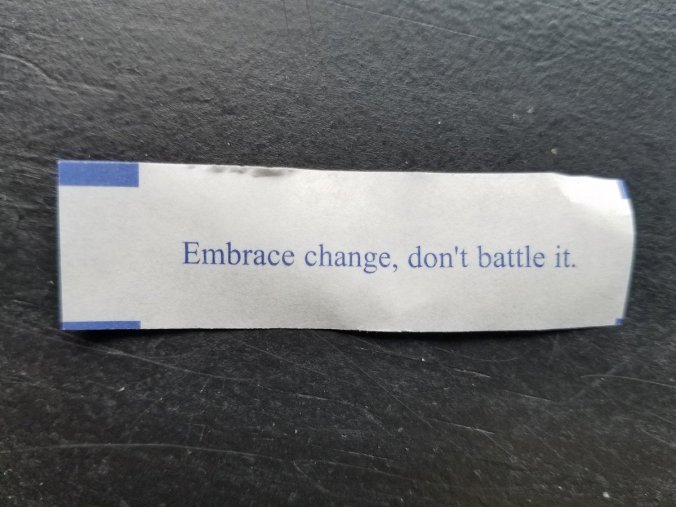
An image from David’s Twitter page this week. He wrote: “Sometimes fortune-cookie wisdom is kind of dead on.”

David with Martha Burns. Better times ahead.
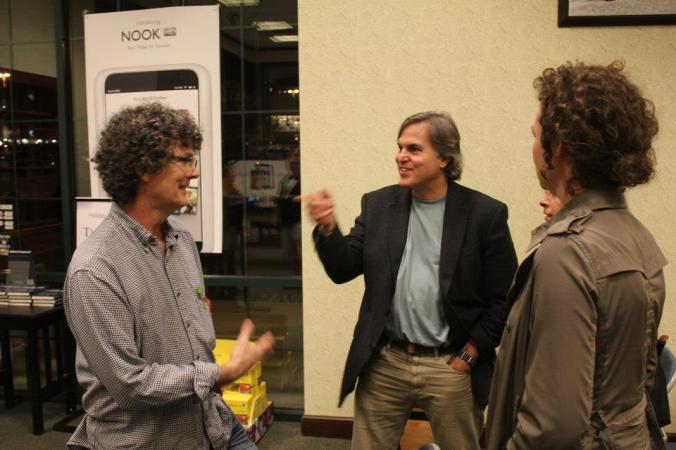
Pingback: Thank you, friends | Piedmont Laureate